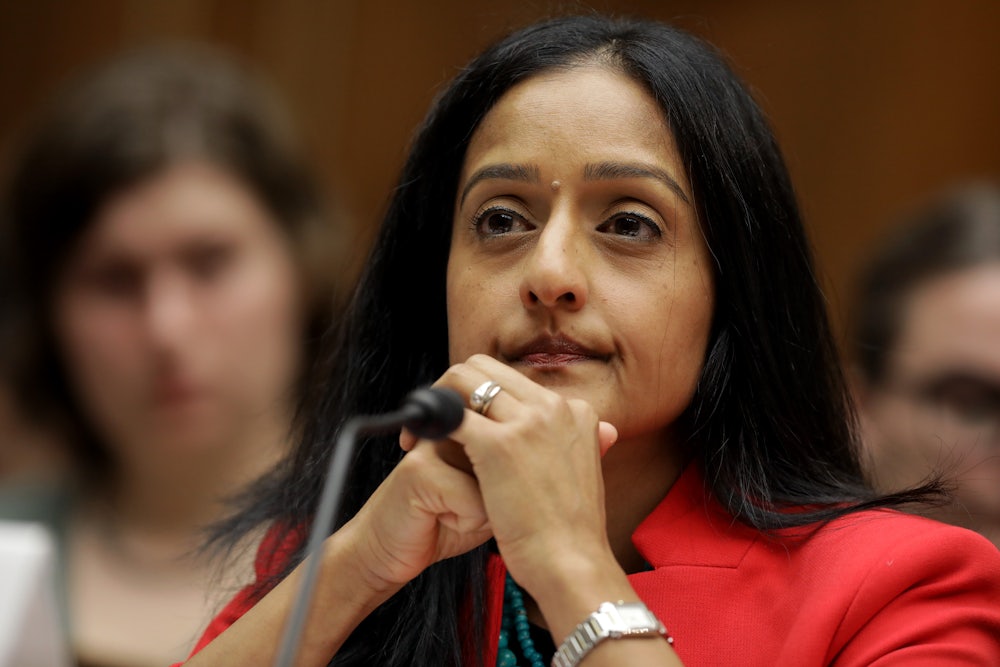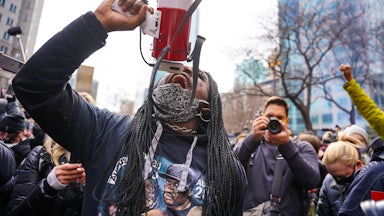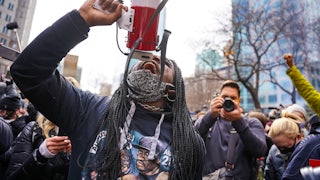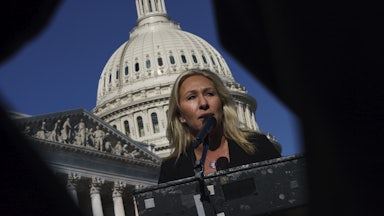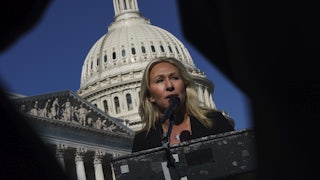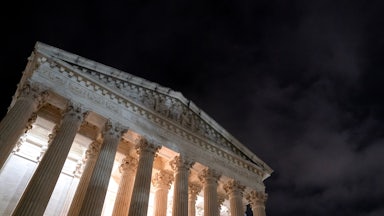In the days to come, there will be plenty of commentary on the implications of Tuesday’s guilty verdict in Derek Chauvin’s trial for the broader police reform agenda, but at least one proximate and relatively straightforward matter has been languishing in Congress for months now.
About halfway through President Biden’s comments on the verdict, he offered a much-needed nudge to Congress to move forward on confirming two of his nominees for senior positions to the Justice Department: Vanita Gupta, for associate attorney general, and Kristen Clarke, to lead the Civil Rights Division. Biden referred to them as “eminently qualified, highly respected lawyers who have spent their entire careers fighting to advance racial equity and justice,” and who “have the experience and the skill necessary to advance our administration’s priorities to root out unconstitutional policing and reform our criminal justice system.”
Both nominations were announced three and a half months ago, along with that of Lisa Monaco, who was confirmed Tuesday as deputy attorney general by a 98–2 vote. The delay in moving these nominees is not out of the ordinary: President Trump’s deputy attorney general, Rod Rosenstein, was confirmed on April 25, 2017, while his associate attorney general, Rachel Brand, wasn’t confirmed until the following month. Indeed, the Senate on Wednesday confirmed Gupta in a 51-49 vote.* But Senate Republicans’ frothing, baseless attacks on Gupta and Clarke are indeed beyond the pale.
Politico reported earlier this week that although they “almost certainly can’t stop” Gupta and Clarke from being confirmed, “Republicans—especially those eyeing the White House—are eager to make the president’s party pay a political price.” Gupta was moved out of the Senate Judiciary Committee late last week after it deadlocked and Senate Majority Leader Chuck Schumer intervened, while Clarke appeared before the committee just last week. The two nominees, both of whom are women of color, have been portrayed by Republicans as radical, race-obsessed ideologues intent on undermining public safety.
As Biden and many others have noted, there is no doubt that Gupta and Clarke are qualified for the jobs. Both have devoted their careers to civil rights work, with Gupta most recently leading the Leadership Conference on Civil and Human Rights and Clarke helming the Lawyers’ Committee for Civil Rights Under Law. Most of their work has been in the nonprofit advocacy sector, but they also know the department: Gupta led the Civil Rights Division for several years during the Obama administration, while Clarke began her career as a line attorney in the Civil Rights Division.
Gupta has drawn broad support from police groups and has long had a reputation even among conservative activists as someone who has been able to build consensus across the political divide in criminal justice reform, but this did not stop Senator Ted Cruz from calling her “an extreme partisan advocate” and “an ideologue” at her confirmation hearing. Senator Chuck Grassley complained that Gupta’s “Twitter feed has painted Republicans with a broad brush, describing the Republican National Convention as three nights of ‘racism, xenophobia and outrageous lies.’” Senator Tom Cotton accused Gupta of supporting “decriminalization of all drugs” and claimed that she “misled” the committee on this point, based on a 2012 op-ed in which she argued that states “should decriminalize simple possession of all drugs, particularly marijuana, and for small amounts of other drugs.” But this is not the same as the “decriminalization of all drugs,” whether you agree with it or not, and in any case Gupta said she had changed her mind in the intervening years, based in part on her family’s experience with the opioid crisis. Republicans also expressed outrage at Gupta’s claim that “we all have implicit bias and racial bias”—an attempt to try to use Gupta’s effort to universalize these problems beyond white people against her, and to twist it into the idea that the entire country is irretrievably racist.
The criticisms from Republican senators at Clarke’s hearing were no more rigorous. John Cornyn—either playing dumb or being dumb—cited an opinion piece that Clarke wrote for her college newspaper in 1994 that, as he put it, “seemed to argue that African Americans were genetically superior to Caucasians.” In fact, it was an attempt to skewer the analysis in Charles Murray’s book The Bell Curve. While her piece was not particularly well executed, whose college writing is? (The New Republic published an excerpt from Murray’s book in 1994, alongside criticisms of it.)
Clarke was also derided—most sharply by Cruz—for supposedly calling to “defund the police” in an op-ed for Newsweek last summer, amid the nationwide protests over Chauvin’s killing of George Floyd. The slipperiness of the phrase obscures the fact that Clarke’s piece is actually an argument against police abolition, but the world of opinion writing being what it is, it is framed as a call “for defunding policing operations that have made African Americans more vulnerable to police violence and contributed to mass incarceration, while investing more in programs and policies that address critical community needs.” Clarke told the committee that the intellectual exercise was premised on a zero-sum budget—that is, that she was proposing to reallocate a conceptually fixed dollar amount—but more to the point, she also said that she supports Biden’s call for an additional $300 million in funding for police throughout the country.
What’s motivating the GOP’s aggressive posture toward Gupta and Clarke? Politico chalked it up to “an opportunity to bolster their argument that the president is a liberal in centrist’s clothing,” while The Washington Post’s Jennifer Rubin argued that Republicans are opposed to any expansion of civil rights. But there are intermingled questions of gender, race, and credentialism that are likely at play, too. Both women have been zealous and effective advocates, which are traits for which men tend to get elevated. They have also spent most of their careers outside of government, which makes it easier to paint them as anti-government outsiders, even though the Justice Department is not exactly a place where a large number of nonwhite lawyers have found a long-term professional home.
It is doubtful that the GOP’s flimsy argument against Gupta and Clarke would have any traction at all were it not for the fact that they are nonwhite. The positions they hold—at least the ones that Republicans have seized on—are well within the mainstream of establishment liberal legal thought, and in fact they reflect repudiations of more aggressive positions on the issues of race and policing that have real advocates on the left.
But it will be much easier to portray these women—rather than, say, Attorney General Merrick Garland or Lisa Monaco, who are white and hold the top two positions in the Justice Department—as the face of likely department initiatives to address racial justice. That includes more work on policing reform, revisions to immigration enforcement priorities that could result in fewer prosecutions, further reversals on the Trump DOJ’s positions in high-profile civil rights disputes, and interventions to combat state-level efforts by Republicans to make it harder to vote. Meanwhile, the Republican Party—whose presidential hopefuls on the Senate Judiciary Committee tried to mock concerns about institutional and systemic racism at Gupta and Clarke’s hearings—nearly formed a white power caucus last week.
Gupta and Clarke are likely to be confirmed, but the Republican opposition to them in general is not what has been most troubling. There are legitimately difficult issues—and legitimate questions to debate—surrounding criminal justice reform, policing, and other civil rights issues that the Biden administration intends to address, but Senate Republicans do not seem to care about them in the slightest. The party seems determined to try to racially demagogue its way back to national power, even as an overwhelming majority of the country applauds the all too rare conviction of a white police officer who murdered a Black man.
* This article has been updated to reflect Gupta’s confirmation on Wednesday.
